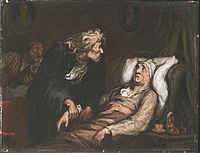
Photo from wikipedia
AIMS AND OBJECTIVES This study describes people's need for reassurance in self-care of minor illnesses. BACKGROUND Self-care and active surveillance are advocated as important strategies to manage minor illnesses. Reassurance… Click to show full abstract
AIMS AND OBJECTIVES This study describes people's need for reassurance in self-care of minor illnesses. BACKGROUND Self-care and active surveillance are advocated as important strategies to manage minor illnesses. Reassurance influences patient satisfaction and confidence in the practicing of self-care. DESIGN This study is a descriptive and interpretive qualitative study. METHODS Twelve persons with experience in self-care and receiving self-care advice were recruited, and data were collected using semi-structured interviews between September-December 2014. Data were analysed using qualitative content analyses. RESULTS Having previous experience and the ability to actively manage symptoms using self-care interventions was described as reassuring. Participants became stressed and concerned when the symptoms persisted and interventions lacked the desired effect, which often resulted in a decision to consult. Participants wanted to feel that the nurse was an actual person, who was sympathetic, present and understanding, when they received self-care advice. The nurse's assessment and reasoning of the symptoms facilitated care-seekers' assessments of risk, and clear and concrete advice on how to manage the symptoms exerted a calming effect. Patients needed to trust that the nurse understood their situation to embrace the advice, and being invited to return created a feeling that the nurse had listened and taken them seriously. CONCLUSIONS Reassurance has the potential to allay doubts and fears to build confidence, which influences self-care and consultation behaviour. Personal presence in the encounter, receiving an assessment and an explanation of the symptoms and precise advice are reassuring. RELEVANCE TO CLINICAL PRACTICE The needs of nursing care may persist despite the absence of medical needs. The encounter between the nurse and care-seeker is a unique possibility for reassurance and confidence that a minor illness is self-limiting in its nature, and self-care interventions provide relief and comfort.
Journal Title: Journal of Clinical Nursing
Year Published: 2018
Link to full text (if available)
Share on Social Media: Sign Up to like & get
recommendations!